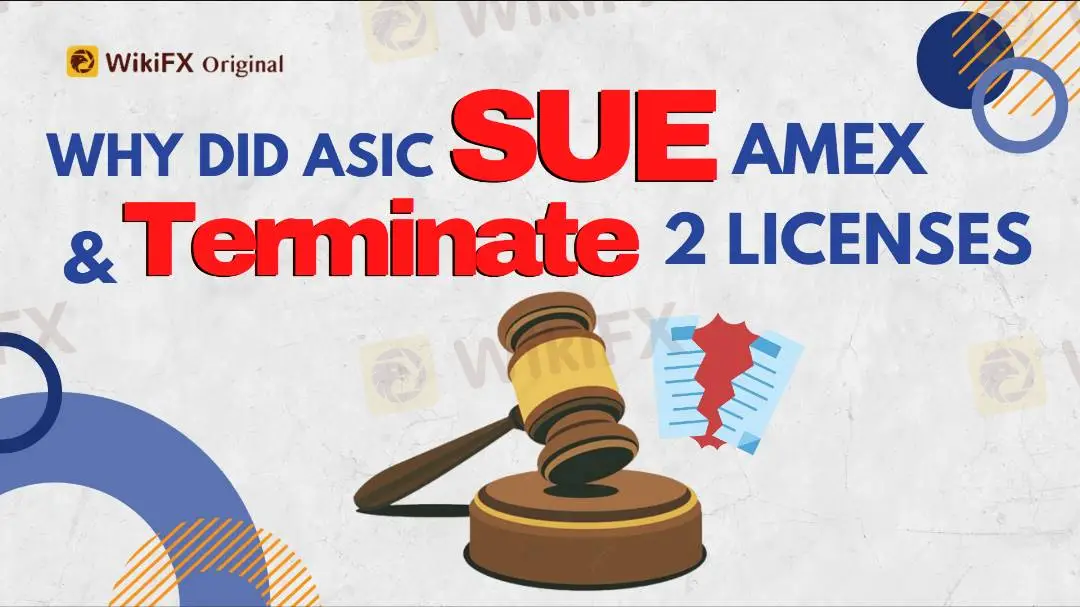简体中文
繁體中文
English
Pусский
日本語
ภาษาไทย
Tiếng Việt
Bahasa Indonesia
Español
हिन्दी
Filippiiniläinen
Français
Deutsch
Português
Türkçe
한국어
العربية
Why Did ASIC Sue Amex and Terminate 2 Licenses?
Abstract:On Tuesday, the financial market watchdog of Australia (ASIC) took civil penalty action against three companies. Keep reading to find out more.

On Tuesday, three companies were subject to regulatory actions by the Australian Securities and Investments Commission (ASIC). The financial market watchdog took civil penalty action against American Express Australia Limited, cancelled AFSL Group Pty Ltd (AFSL Group) authorization, and suspended Quantum Funds Management Limited's (QFML) Australian financial services (AFS) licence (Amex).
Four managed investment schemes were being run by QMFL, whose licence was suspended. According to ASIC, the company lacks sufficient liability insurance to offer such products. The entity may continue to offer the services required to wind up the current schemes after the suspension.
In its first civil penalty case involving the breach of distribution and credit card design duties, the regulator has reportedly started court proceedings against American Express Australia, according to a press release from December 6th 2022.
Co-branded credit cards were available from Amex and the David Jones retail chain. Amex ought to have created a Target Market Determination (TMD) to evaluate the product's proper distribution and the potential pool of pertinent recipients. According to ASIC, people who wanted to use a card that earned loyalty points to make credit purchases were not restricted by the TMDs that the company presented.
The regulator claims that the business was aware of the high cancellation rate for David Jones cards, which was significantly higher than the cancellation rate for regular credit cards. Amex was also aware that some customers were confused by the offer and didn't know if they had applied for a credit card or a loyalty card. Amex should have stopped issuing credit cards as a result, but it did so until July 5th, 2022.
“The issuers and distributors of financial products must adopt a consumer-centric strategy under the design and distribution obligation. Product providers cannot approach product governance with a ”set-and-forget mindset“ and must continuously assess whether consumers are receiving products that meet their needs. Providers must react to poor outcomes by changing their practises, ”ASIC's deputy chair, Sara Court, said.
As the country's corporate regulator, the Australian Securities and Investments Commission (ASIC) is a separate agency of the Australian government. The purpose of ASIC is to enforce laws protecting Australian consumers, investors, and creditors by regulating business and financial services.
Use WikiFXs free mobile application to find ASIC-regulated brokers. We are a global forex broker regulatory query platform that stores verified information in collaboration with national regulators, including ASIC.



Disclaimer:
The views in this article only represent the author's personal views, and do not constitute investment advice on this platform. This platform does not guarantee the accuracy, completeness and timeliness of the information in the article, and will not be liable for any loss caused by the use of or reliance on the information in the article.
Read more

Alleged Concerns with TradeEU.global's Trading Practices
An individual trader has come forward with allegations of an unfavourable experience while using the services of the broker TradeEU.global.

Lured by False Promises: Malaysian Driver Lost RM218K to an Investment Scam
A 49-year-old e-hailing driver in Malaysia fell victim to a fraudulent investment scheme, losing RM218,000 in a matter of weeks. The scheme, which falsely promised returns of 3 to 5 per cent within just three days, left the individual financially devastated.

SFC Freezes $91M in Client Accounts Amid Fraud Probe
SFC freezes $91M in client accounts at IBHK, SBI, Monmonkey, and Soochow over suspected hacking and market manipulation during unauthorized online trades.

Italian Regulator Warns Against 5 Websites
The Italian regulator, CONSOB has issued a warning against five websites offering unauthorized financial services. This regulatory action aims to protect the public from fraudulent activities.
WikiFX Broker
Latest News
What Makes Cross-Border Payments Easier Than Ever?
Trader Exposes Unethical Practices by STP Trading
Saxo & Portuguese Bank Partnership
SEC Fines Broker-Dealers $275K for Incomplete SAR Filings
Lured by False Promises: Malaysian Driver Lost RM218K to an Investment Scam
FTX Sets March 2025 Timeline for Creditor Payouts: What It Means for Investors
What is an Economic Calendar? How it works
Italian Regulator Warns Against 5 Websites
Mastercard's 2030 Vision: Biometric-Driven, Tokenized Payments
SFC Freezes $91M in Client Accounts Amid Fraud Probe
Currency Calculator


